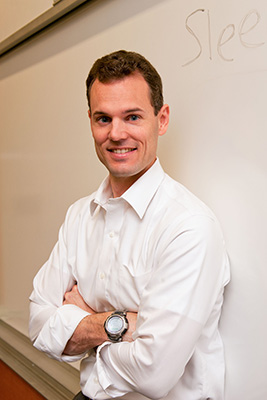Quality sleep is essential to inspire—and to be inspired
Well-rested leaders are more capable of inspiring followers. And well-rested followers are more likely to be inspired by charismatic leaders.
That’s the gist of a new study by Christopher M. Barnes, an associate professor of management at the University of Washington Foster School of Business.
“Unfortunately, sleep deprivation undermines both the experience of positive emotion as well as the regulation of emotion,” writes Barnes in his recent Harvard Business Review Blog post. “As a result, sleep-deprived leaders are less likely to show positive emotion to their teams, and sleep-deprived team members will be less likely to experience positive emotion.”
“In other words, sleep-deprived leaders are less inspiring, and sleep-deprived team members are harder to inspire.”
Undermining charisma
Researchers define charismatic leadership as the ability to genuinely inspire followers, fostering an impression that the leader and the mission are extraordinary. Charisma, Barnes adds, “is a powerful skill for any leader who wants to increase the performance of their team.”
Like other leadership attributes, effective charisma is dependent on more than a leader’s natural ability to convey positivity and a sense of shared endeavor to followers. Barnes wondered if physiological conditions could also be a factor.
To find out, the expert in the effects of sleep deprivation in the workplace revisited the familiar condition of fatigue.
Barnes and co-authors Cristiano L. Guarana, Shazia Nauman, and Dejun Tony Kong designed two studies to investigate whether or not sleep deprivation undermines the positive effects of charisma for leaders and followers.
They examined charisma via the vector of leader communication. In the first study, sleep-deprived students were evaluated as less charismatic than well-rested peers in delivering a commencement speech. Barnes attributes this perception to the weary speakers’ inability to regulate their displays of positive emotion.
The second study examined the other side of the equation. The students played the role of a subordinate to a leader delivering a speech. And those who were sleep-deprived rated the speakers as less charismatic than did their well-rested counterparts. Barnes attributes this perception to lower positive emotion production as a result of fatigue, making the weary students more difficult to inspire.
Good night’s sleep
Barnes says that charismatic leadership is an important currency for high-performing teams and organizations. And learning that charisma is so vulnerable to sleep deprivation—both in leaders and in followers—should sound an alarm to many managers.
“Many leaders are sleep-deprived most of the time. Moreover, leaders often create sleep-depriving conditions for the people they lead…” writes Barnes, an Evert McCabe Endowed Faculty Fellow at Foster. “Thus, many leaders are sabotaging their own ability to effectively lead their teams.
“The bottom line is this: if you want to inspire, you and the people you lead all need to do your best to get a good night of sleep.”
“Too Tired to Inspire or Be Inspired: Sleep Deprivation and Charismatic Leadership” is forthcoming in the Journal of Applied Psychology.
Read more about the study in the HBR Blog.

